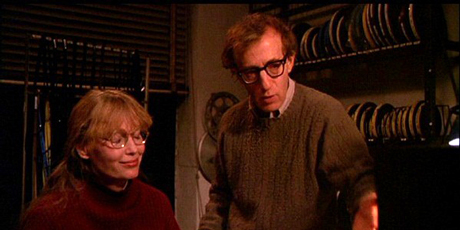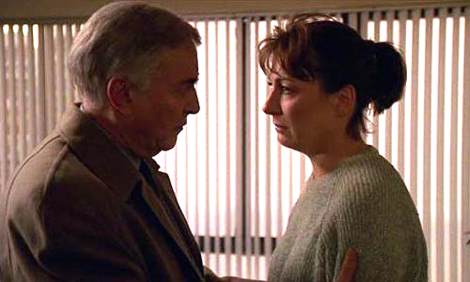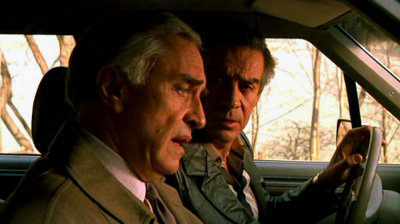|
|
Reviewed by Glenn Erickson
For the last fifteen years or so I've been complaining that Woody Allen has really slacked off as a movie director. Most of his original screenplays now seem structurally re-arranged from plays, books, and movies he admires. Others are weak revisits of three-column joke essays he wrote for The New Yorker. Nowadays fans aren't telling him to go back to "his old movies -- the funny ones" as much as they miss his late- 1980s comedy-dramas that frequently stretched his range, and revealed more of his inner self.
Allen's richest string of movies started with 1984's Broadway Danny Rose and with a couple of breaks continued through 1990's Alice. Probably the big winner and Allen's warmest show is Hannah and Her Sisters, but his most ambitious effort may be 1989's Crimes and Misdemeanors, which I suppose could be looked at as Crime and Punishment with a little of Bergman's Wild Strawberries thrown in for good measure. Allen practically went off the rails with his 'serious' chamber pieces September (1987) and Another Woman (1988), which showed him trying to be Ingmar Bergman and Tennessee Williams and not doing very well with either. Crimes and Misdemeanors is something else. Insightful without insisting on profundity, it follows a small group of flawed people as they navigate issues in their lives ranging from romance to career choices. After a dozen films poking fun at religion, Allen also faces the moral teachings of a traditional Judaic upbringing, and gives them a good hearing. More importantly, Allen presents a range of characters much broader than anything he's shown before.

The marriage of frustrated docu filmmaker Cliff Stern (Woody Allen) is falling apart; he spends more and more time with his young niece Jenny (Jenny Nichols). Cliff's wife Wendy is fed up with his artistic posturing and failure to seek commercial work, and sets him up to film a fluff docu on her brother Lester (Alan Alda), a famous actor-producer of sitcoms. Cliff takes the job and is immediately drawn to an ambitious production person on the show, Halley Reed (Mia Farrow). Halley sees great possibilities in Cliff's unfinished film on the humanist philosopher Louis Levy (Martin Bergmann), who professes positive ideas about the human condition despite having lost his entire family to the Holocaust. Meanwhile, the wealthy and urbane eye doctor/philanthropist Judah Rosenthal (Martin Landau) has found himself in a bind that threatens his untainted life and reputation: he's had a two-year affair with Dolores Paley (Anjelica Huston), an emotionally unstable stewardess who now demands that Judah leave his socialite wife Miriam (Claire Bloom) for her. As an added incentive, Dolores threatens to go public with certain financial indiscretions that Judah has swept under the rug. Judah goes to the young rabbi Ben (Sam Waterston) for advice, and receives a wisdom-laden appeal to confess all to Miriam and hope for forgiveness. But Judah no longer believes in such things. He's tempted to call in his brother Jack, the black sheep of the family and a shady underworld figure. Jack's solution to Judah's problem is much more direct.
Crimes and Misdemeanors is a grouping of several very different kinds of stories, but Woody Allen manages to unite them in tone. The lighter Woody Allen material doesn't clash with the much heavier murder story of Martin Landau's troubled Judah Rosenthal. For the first time Allen's character isn't really attractive to any of the women in his life, and he finds himself happiest when entertaining his pubescent niece Jenny. If this is autobiographical material, it's pretty potent stuff. Allen's Cliff Stern has earned the open scorn of his wife Wendy, and can only attract the quiet but focused Halley to his film project, not himself. Cliff thinks he's scoring points by deriding and eventually lampooning the pompous Lester, both in conversation and on film, but he only makes himself seem insecure and petty.
Alan Alda's Lester may be a celebrity creep, but people like Halley are attracted to him because they want to travel in his circle of success. Allen uses Lester for comedy relief. By the time we see Cliff's rough cut of his film on Lester, Allen is having a high time getting big laughs: a "Francis" - like mule speaks with Lester's voice, saying "If it bends, it's funny!" Lester is so self-obsessed that he interrupts party conversations to record memos to himself on a tape recorder. But he's no exaggeration -- I've met my share of Hollywood types whose behavior is just as crass.
Even Woody's segment of the story contains a note of horror, when Cliff's love-starved sister confesses that she was molested by a date she found in the personals ad, who turned out to be a pervert. She can only be grateful that the man wasn't a serial killer. And Cliff must face his own crisis of disillusion when his cherished professor Levy, the sage who talks so eloquently of love, does something that undercuts any possibility of his story making a coherent documentary film.

Crimes and Misdemeanors' central story is a wholly believable and unusually insightful turn on what is really a film noir situation: a wealthy married man considers ridding himself of a threatening extramarital lover, through murder. Judah Rosenthal admits that he was thoughtless, vain, and irresponsible to start a relationship with Dolores Paley. Although he denies it, it's clear enough that he made rash promises about leaving his wife. Now Judah calls in his gangster brother Jack, who he's helped out before with loans. It's obvious what Judah wants but he's such a moral coward that he insists on trying to make it seem that murder is Jack's idea, that such a solution would never occur to a man such as himself. (spoiler spoiler spoiler) The pillar of respectability cannot take responsibility for his actions before, during or even after the event, at which time he wallows in cheap guilt and talks empty talk about turning himself in. Of course he won't, as he's too much of a selfish coward. Judah wails about the injustice of having his cozy personal world destroyed. He's the real victim, you see.
Unless there's some precedent I haven't seen, the Judah Rosenthal episode may be Woody Allen's most accomplished dramatic construction. It doesn't play flat and hollow like his pair of 'serious' dramas. The end of Dolores is more like something one might expect in a Martin Scorsese picture, except that the expected violence occurs off-screen. Allen even plays the scene against the classical music that Dolores bought to please Judah, to powerful effect. It's at this point that we suddenly feel a moral tug beyond film noir conventions. Dolores (a superb performance by Anjelica Huston) doesn't deserve to die, like an inconvenient character in a movie. Judah must look into her dead eyes -- he's an eye specialist, of course -- and realize that if her eyes ever were a window to her soul, they are no longer. Thus Allen actually gets close (at least verbally) to the superb dead-eye image in Alfred Hitchcock's Psycho, which makes the same profound statement with images only. Death is The End.
Woody never undercuts these themes, but we walks the fence when he playfully inserts amusing clips from movies where bad guys plot killings or Betty Hutton sings, "Murder, He Says!". What makes a bigger impact is the pull of traditional religious teaching on Judah. He has a Wild Strawberries flashback scene in which his devout father makes the case for faith over the truth, and parries words with a Communist daughter over the right way to face injustice in the world. Judah doesn't find solace here, as this father figure is not the kind of person to whom he feels he can confess. Judah has written off his brother Jack so he doesn't mind confessing his sins to him. The utterly pragmatic Jack has long ago found he cannot afford to give morality a place in his life decisions -- his world is too cruel and unforgiving. Not welcome in Judah's home or among his social set, Jack is highly sympathetic. He may have been a true S.O.B. when he was younger, but he's mellowed. He practically carries the weakling Judah through the whole process, without judging him -- we can see that he wishes he were closer to his 'respectable' brother. Judah surely felt comfortably superior to Jack when he loaned him money. Now he can't face anything. He knows he's a fake, a guy toasted by his rich associates for knowing the best restaurant in Athens or the best hotel in Moscow.

Meanwhile, Woody Allen has identified a 'Jewish Saint' character in his story, in the person of Sam Waterston's Rabbi. Ben talks to Judah during an eye examination, and by the end of the film must attend his daughter's wedding while blind. But unlike anyone else in the story, including Judah's stern father and the philosopher Louis Levy, Sam is at peace with his faith, his family and his fellow man. In classical terms I suppose one would say that Ben has gone blind, as a blessing so he doesn't have to see all the evil in the world around him. But we know that Ben can accept anything that comes, and still help others along the way.
Woody Allen is often criticized for his narrow range of characters and for the use of 'easy identifiers' whenever dealing with folk outside his experience -- it seems a bit shallow when his Scandinavian artist in Hannah is a direct transplant from an Ingmar Bergman picture both in character and choice of actor. Most of the characters in Misdemeanors are Jewish but they're much more acute than usual, and dealing with serious problems outside of Allen's usual range.
Who would have believed that Woody Allen could make a movie with big laughs, while simultaneously probing into a murderer's difficulty in accepting his dark deeds, and living with them? Martin Landau's tortured soul may be the strongest performance in a Woody Allen movie, ever. He won his Oscar for his clever impersonation of Bela Lugosi for Tim Burton, but this is the picture that should have earned him the big prize.

The Twilight Time Blu-ray of Crimes and Misdemeanors is a fine MGM (Deluxe Digital) transfer of one of Woody Allen's very best films. Sven Nyqvist's cinematography makes its emotional statements without ever betraying a hint of 'dramatic lighting' effects.
The show comes with an Isolated Music and Effects Track and an original Trailer.
On a scale of Excellent, Good, Fair, and Poor,
Crimes and Misdemeanors Blu-ray rates:
Movie: Excellent
Video: Excellent
Sound: Excellent
Supplements: Isolated Music & Effects Track; original trailer
Deaf and Hearing Impaired Friendly?
YES; Subtitles: English
Packaging: Keep case
Reviewed: March 1, 2014

Text © Copyright 2014 Glenn Erickson
See more exclusive reviews on the Savant Main Page.
Reviews on the Savant main site have additional credits information and are often updated and annotated with reader input and graphics.
T'was Ever Thus.
Return to Top of Page
|

